Psychology Report: Psychological Theories and Human Development
VerifiedAdded on 2020/10/04
|15
|4433
|269
Report
AI Summary
This report delves into the psychology of health and social care, examining the impact of various factors on human behavior. It explores different theories of life span development, including Erikson's psychosocial theory and Freud's psychosexual theory, and discusses the similarities and differences between them. The report then explains how psychological theories, such as behavioral, cognitive, psychodynamic, and humanistic approaches, relate to different stages of human development. It also analyzes the influence of social and biological factors on human behavior, considering elements like culture, socioeconomic status, and environmental factors. Furthermore, the report investigates the application of psychological theories in health and social care settings, addressing topics like behavior disturbances, mental disorders, and the enhancement of relationships. Overall, the report provides a comprehensive overview of the psychological principles that are relevant to understanding and improving health and social care practices.
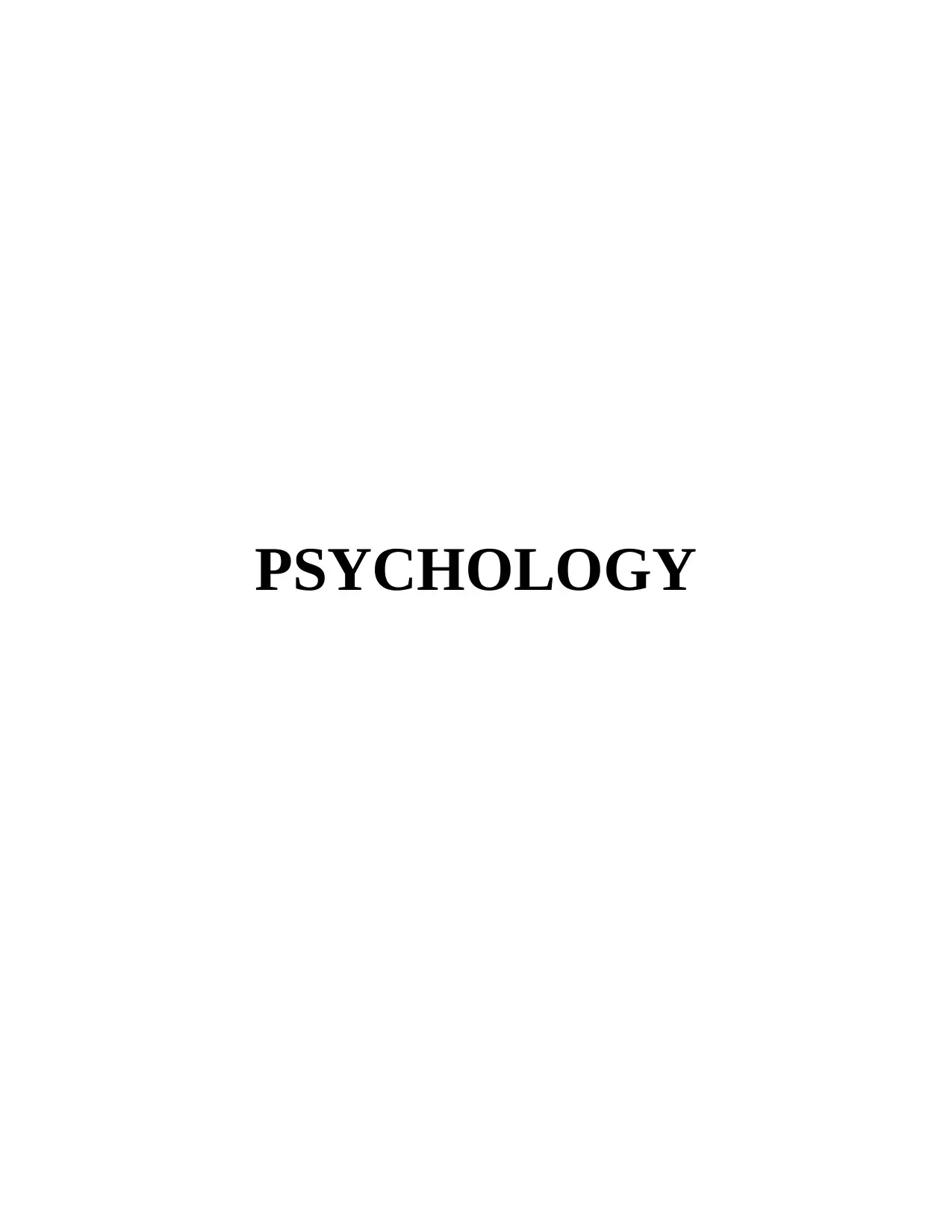
PSYCHOLOGY
Paraphrase This Document
Need a fresh take? Get an instant paraphrase of this document with our AI Paraphraser
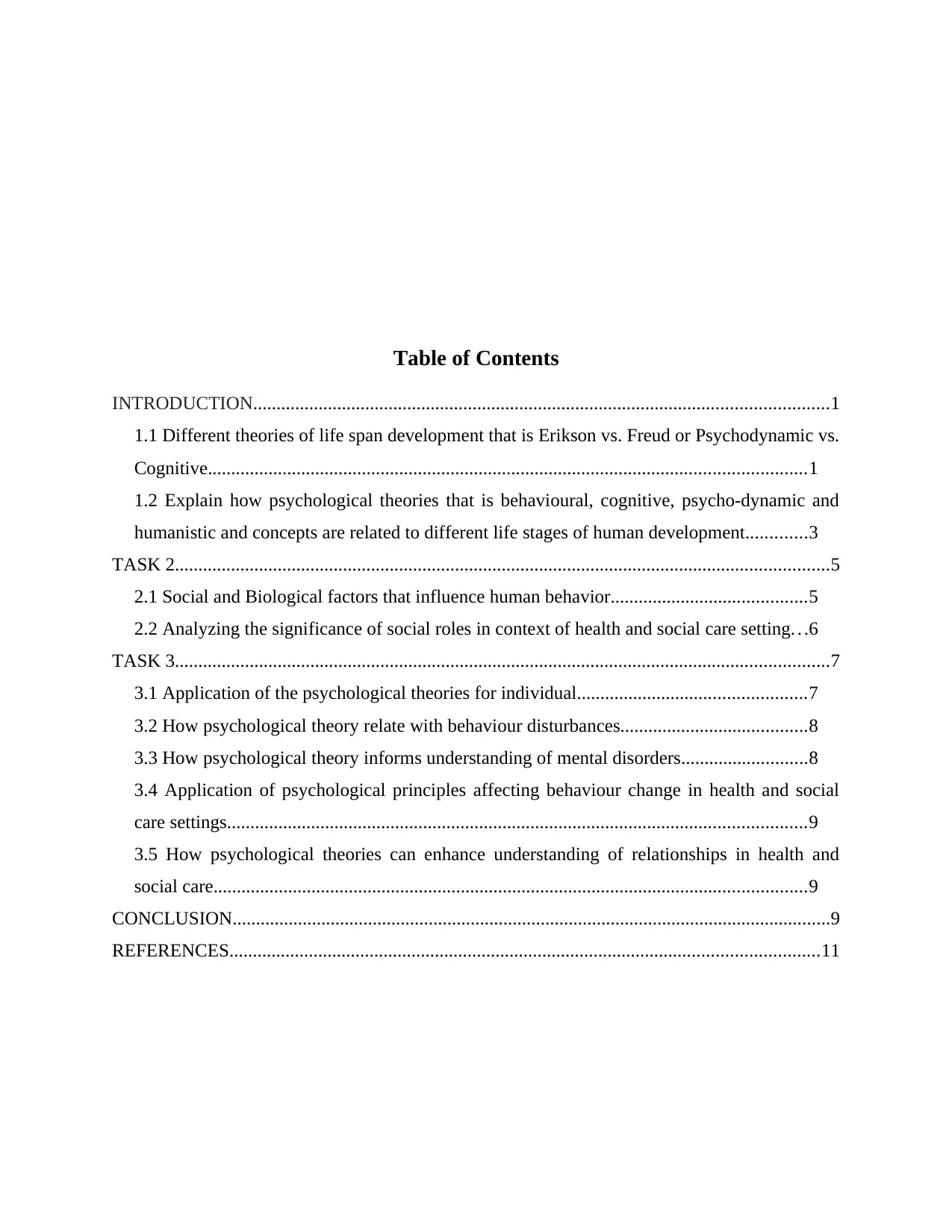
Table of Contents
INTRODUCTION...........................................................................................................................1
1.1 Different theories of life span development that is Erikson vs. Freud or Psychodynamic vs.
Cognitive................................................................................................................................1
1.2 Explain how psychological theories that is behavioural, cognitive, psycho-dynamic and
humanistic and concepts are related to different life stages of human development.............3
TASK 2............................................................................................................................................5
2.1 Social and Biological factors that influence human behavior..........................................5
2.2 Analyzing the significance of social roles in context of health and social care setting. . .6
TASK 3............................................................................................................................................7
3.1 Application of the psychological theories for individual.................................................7
3.2 How psychological theory relate with behaviour disturbances........................................8
3.3 How psychological theory informs understanding of mental disorders...........................8
3.4 Application of psychological principles affecting behaviour change in health and social
care settings............................................................................................................................9
3.5 How psychological theories can enhance understanding of relationships in health and
social care...............................................................................................................................9
CONCLUSION................................................................................................................................9
REFERENCES..............................................................................................................................11
INTRODUCTION...........................................................................................................................1
1.1 Different theories of life span development that is Erikson vs. Freud or Psychodynamic vs.
Cognitive................................................................................................................................1
1.2 Explain how psychological theories that is behavioural, cognitive, psycho-dynamic and
humanistic and concepts are related to different life stages of human development.............3
TASK 2............................................................................................................................................5
2.1 Social and Biological factors that influence human behavior..........................................5
2.2 Analyzing the significance of social roles in context of health and social care setting. . .6
TASK 3............................................................................................................................................7
3.1 Application of the psychological theories for individual.................................................7
3.2 How psychological theory relate with behaviour disturbances........................................8
3.3 How psychological theory informs understanding of mental disorders...........................8
3.4 Application of psychological principles affecting behaviour change in health and social
care settings............................................................................................................................9
3.5 How psychological theories can enhance understanding of relationships in health and
social care...............................................................................................................................9
CONCLUSION................................................................................................................................9
REFERENCES..............................................................................................................................11
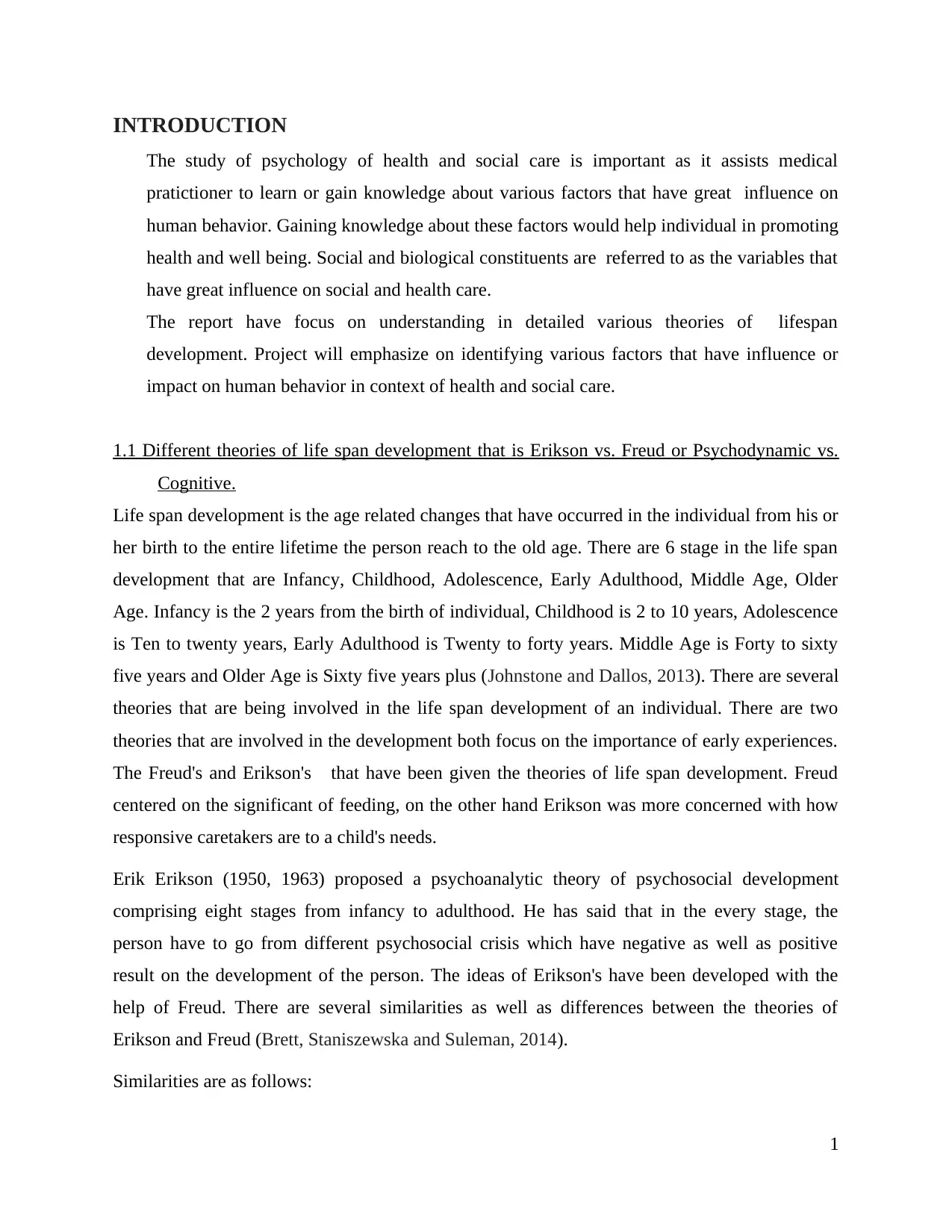
INTRODUCTION
The study of psychology of health and social care is important as it assists medical
pratictioner to learn or gain knowledge about various factors that have great influence on
human behavior. Gaining knowledge about these factors would help individual in promoting
health and well being. Social and biological constituents are referred to as the variables that
have great influence on social and health care.
The report have focus on understanding in detailed various theories of lifespan
development. Project will emphasize on identifying various factors that have influence or
impact on human behavior in context of health and social care.
1.1 Different theories of life span development that is Erikson vs. Freud or Psychodynamic vs.
Cognitive.
Life span development is the age related changes that have occurred in the individual from his or
her birth to the entire lifetime the person reach to the old age. There are 6 stage in the life span
development that are Infancy, Childhood, Adolescence, Early Adulthood, Middle Age, Older
Age. Infancy is the 2 years from the birth of individual, Childhood is 2 to 10 years, Adolescence
is Ten to twenty years, Early Adulthood is Twenty to forty years. Middle Age is Forty to sixty
five years and Older Age is Sixty five years plus (Johnstone and Dallos, 2013). There are several
theories that are being involved in the life span development of an individual. There are two
theories that are involved in the development both focus on the importance of early experiences.
The Freud's and Erikson's that have been given the theories of life span development. Freud
centered on the significant of feeding, on the other hand Erikson was more concerned with how
responsive caretakers are to a child's needs.
Erik Erikson (1950, 1963) proposed a psychoanalytic theory of psychosocial development
comprising eight stages from infancy to adulthood. He has said that in the every stage, the
person have to go from different psychosocial crisis which have negative as well as positive
result on the development of the person. The ideas of Erikson's have been developed with the
help of Freud. There are several similarities as well as differences between the theories of
Erikson and Freud (Brett, Staniszewska and Suleman, 2014).
Similarities are as follows:
1
The study of psychology of health and social care is important as it assists medical
pratictioner to learn or gain knowledge about various factors that have great influence on
human behavior. Gaining knowledge about these factors would help individual in promoting
health and well being. Social and biological constituents are referred to as the variables that
have great influence on social and health care.
The report have focus on understanding in detailed various theories of lifespan
development. Project will emphasize on identifying various factors that have influence or
impact on human behavior in context of health and social care.
1.1 Different theories of life span development that is Erikson vs. Freud or Psychodynamic vs.
Cognitive.
Life span development is the age related changes that have occurred in the individual from his or
her birth to the entire lifetime the person reach to the old age. There are 6 stage in the life span
development that are Infancy, Childhood, Adolescence, Early Adulthood, Middle Age, Older
Age. Infancy is the 2 years from the birth of individual, Childhood is 2 to 10 years, Adolescence
is Ten to twenty years, Early Adulthood is Twenty to forty years. Middle Age is Forty to sixty
five years and Older Age is Sixty five years plus (Johnstone and Dallos, 2013). There are several
theories that are being involved in the life span development of an individual. There are two
theories that are involved in the development both focus on the importance of early experiences.
The Freud's and Erikson's that have been given the theories of life span development. Freud
centered on the significant of feeding, on the other hand Erikson was more concerned with how
responsive caretakers are to a child's needs.
Erik Erikson (1950, 1963) proposed a psychoanalytic theory of psychosocial development
comprising eight stages from infancy to adulthood. He has said that in the every stage, the
person have to go from different psychosocial crisis which have negative as well as positive
result on the development of the person. The ideas of Erikson's have been developed with the
help of Freud. There are several similarities as well as differences between the theories of
Erikson and Freud (Brett, Staniszewska and Suleman, 2014).
Similarities are as follows:
1
⊘ This is a preview!⊘
Do you want full access?
Subscribe today to unlock all pages.

Trusted by 1+ million students worldwide
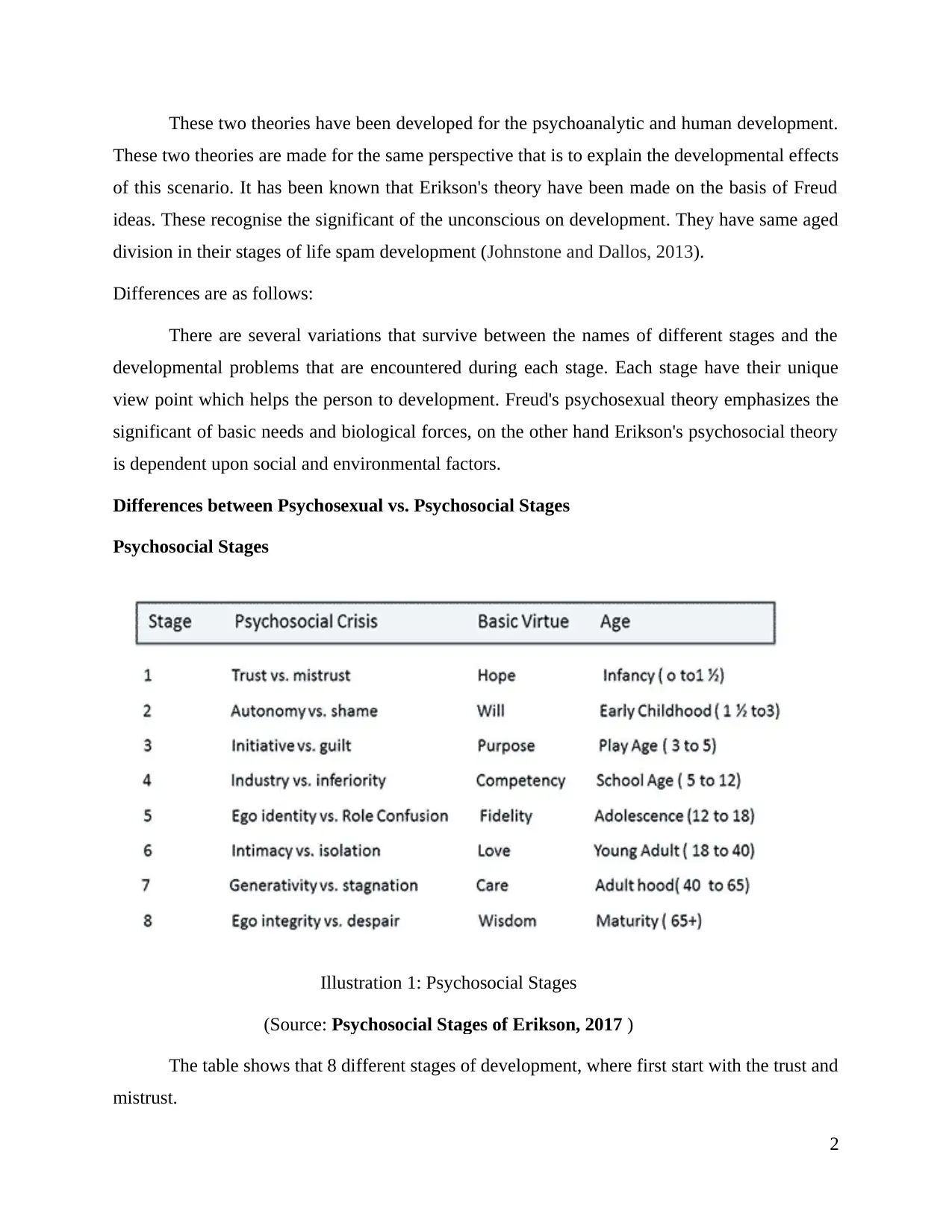
These two theories have been developed for the psychoanalytic and human development.
These two theories are made for the same perspective that is to explain the developmental effects
of this scenario. It has been known that Erikson's theory have been made on the basis of Freud
ideas. These recognise the significant of the unconscious on development. They have same aged
division in their stages of life spam development (Johnstone and Dallos, 2013).
Differences are as follows:
There are several variations that survive between the names of different stages and the
developmental problems that are encountered during each stage. Each stage have their unique
view point which helps the person to development. Freud's psychosexual theory emphasizes the
significant of basic needs and biological forces, on the other hand Erikson's psychosocial theory
is dependent upon social and environmental factors.
Differences between Psychosexual vs. Psychosocial Stages
Psychosocial Stages
Illustration 1: Psychosocial Stages
(Source: Psychosocial Stages of Erikson, 2017 )
The table shows that 8 different stages of development, where first start with the trust and
mistrust.
2
These two theories are made for the same perspective that is to explain the developmental effects
of this scenario. It has been known that Erikson's theory have been made on the basis of Freud
ideas. These recognise the significant of the unconscious on development. They have same aged
division in their stages of life spam development (Johnstone and Dallos, 2013).
Differences are as follows:
There are several variations that survive between the names of different stages and the
developmental problems that are encountered during each stage. Each stage have their unique
view point which helps the person to development. Freud's psychosexual theory emphasizes the
significant of basic needs and biological forces, on the other hand Erikson's psychosocial theory
is dependent upon social and environmental factors.
Differences between Psychosexual vs. Psychosocial Stages
Psychosocial Stages
Illustration 1: Psychosocial Stages
(Source: Psychosocial Stages of Erikson, 2017 )
The table shows that 8 different stages of development, where first start with the trust and
mistrust.
2
Paraphrase This Document
Need a fresh take? Get an instant paraphrase of this document with our AI Paraphraser
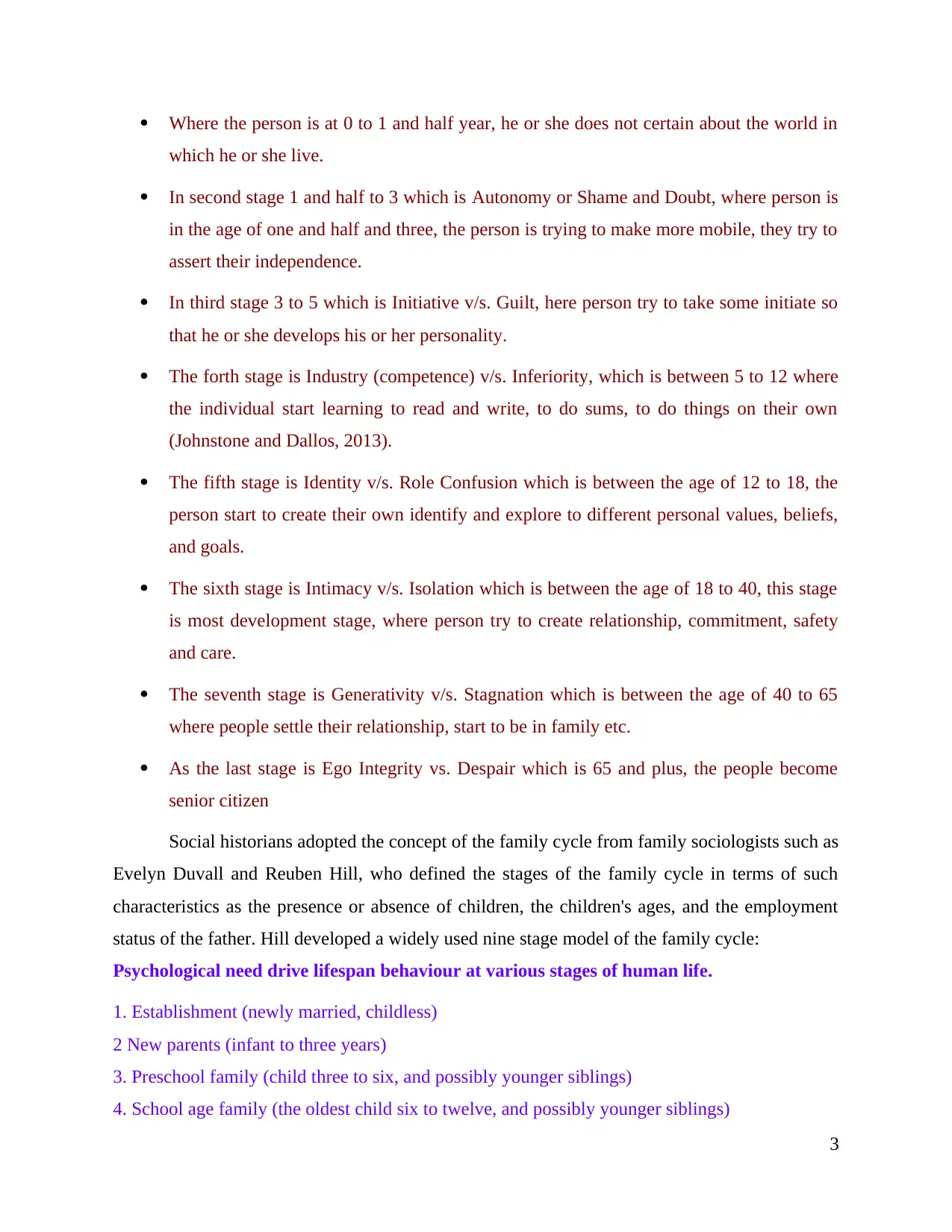
Where the person is at 0 to 1 and half year, he or she does not certain about the world in
which he or she live.
In second stage 1 and half to 3 which is Autonomy or Shame and Doubt, where person is
in the age of one and half and three, the person is trying to make more mobile, they try to
assert their independence.
In third stage 3 to 5 which is Initiative v/s. Guilt, here person try to take some initiate so
that he or she develops his or her personality.
The forth stage is Industry (competence) v/s. Inferiority, which is between 5 to 12 where
the individual start learning to read and write, to do sums, to do things on their own
(Johnstone and Dallos, 2013).
The fifth stage is Identity v/s. Role Confusion which is between the age of 12 to 18, the
person start to create their own identify and explore to different personal values, beliefs,
and goals.
The sixth stage is Intimacy v/s. Isolation which is between the age of 18 to 40, this stage
is most development stage, where person try to create relationship, commitment, safety
and care.
The seventh stage is Generativity v/s. Stagnation which is between the age of 40 to 65
where people settle their relationship, start to be in family etc.
As the last stage is Ego Integrity vs. Despair which is 65 and plus, the people become
senior citizen
Social historians adopted the concept of the family cycle from family sociologists such as
Evelyn Duvall and Reuben Hill, who defined the stages of the family cycle in terms of such
characteristics as the presence or absence of children, the children's ages, and the employment
status of the father. Hill developed a widely used nine stage model of the family cycle:
Psychological need drive lifespan behaviour at various stages of human life.
1. Establishment (newly married, childless)
2 New parents (infant to three years)
3. Preschool family (child three to six, and possibly younger siblings)
4. School age family (the oldest child six to twelve, and possibly younger siblings)
3
which he or she live.
In second stage 1 and half to 3 which is Autonomy or Shame and Doubt, where person is
in the age of one and half and three, the person is trying to make more mobile, they try to
assert their independence.
In third stage 3 to 5 which is Initiative v/s. Guilt, here person try to take some initiate so
that he or she develops his or her personality.
The forth stage is Industry (competence) v/s. Inferiority, which is between 5 to 12 where
the individual start learning to read and write, to do sums, to do things on their own
(Johnstone and Dallos, 2013).
The fifth stage is Identity v/s. Role Confusion which is between the age of 12 to 18, the
person start to create their own identify and explore to different personal values, beliefs,
and goals.
The sixth stage is Intimacy v/s. Isolation which is between the age of 18 to 40, this stage
is most development stage, where person try to create relationship, commitment, safety
and care.
The seventh stage is Generativity v/s. Stagnation which is between the age of 40 to 65
where people settle their relationship, start to be in family etc.
As the last stage is Ego Integrity vs. Despair which is 65 and plus, the people become
senior citizen
Social historians adopted the concept of the family cycle from family sociologists such as
Evelyn Duvall and Reuben Hill, who defined the stages of the family cycle in terms of such
characteristics as the presence or absence of children, the children's ages, and the employment
status of the father. Hill developed a widely used nine stage model of the family cycle:
Psychological need drive lifespan behaviour at various stages of human life.
1. Establishment (newly married, childless)
2 New parents (infant to three years)
3. Preschool family (child three to six, and possibly younger siblings)
4. School age family (the oldest child six to twelve, and possibly younger siblings)
3
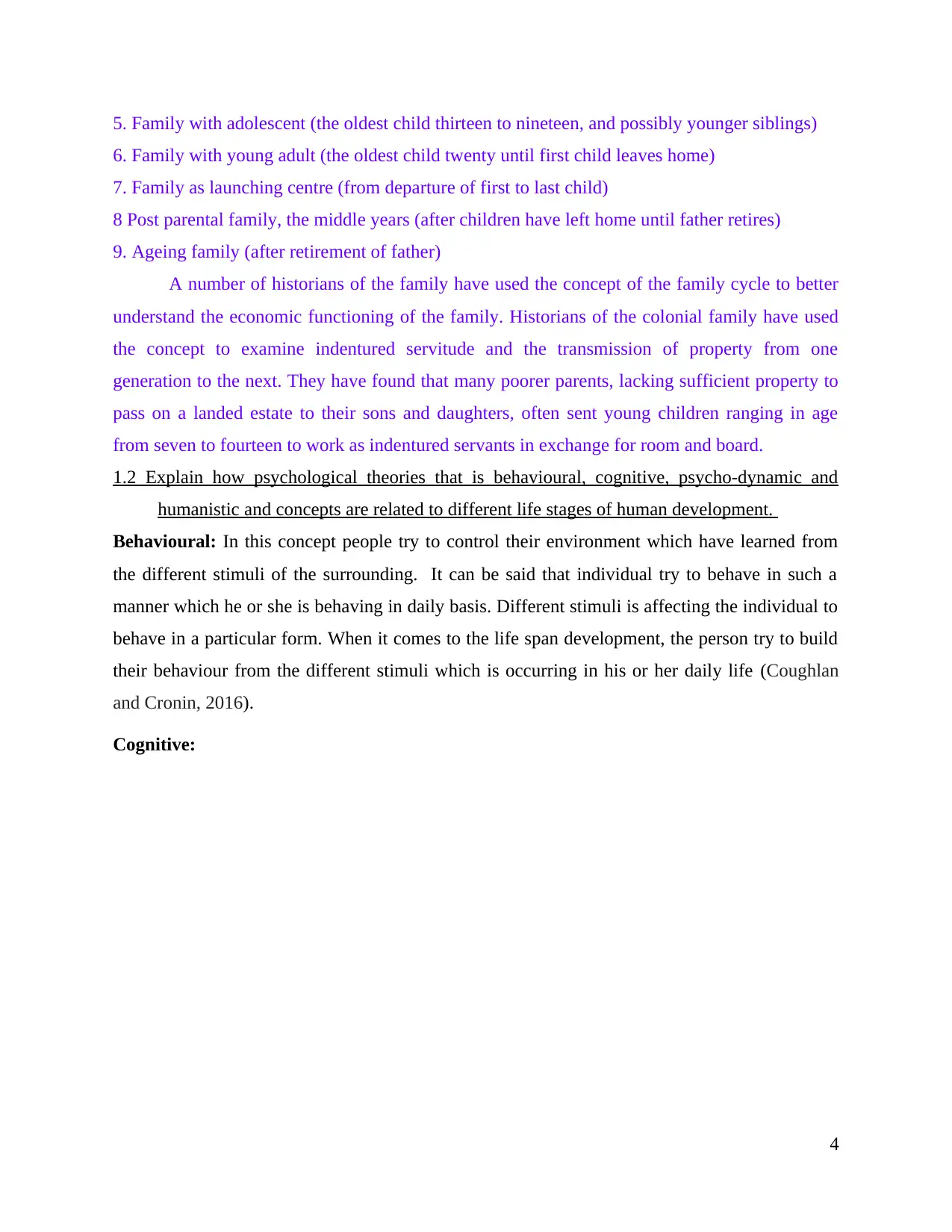
5. Family with adolescent (the oldest child thirteen to nineteen, and possibly younger siblings)
6. Family with young adult (the oldest child twenty until first child leaves home)
7. Family as launching centre (from departure of first to last child)
8 Post parental family, the middle years (after children have left home until father retires)
9. Ageing family (after retirement of father)
A number of historians of the family have used the concept of the family cycle to better
understand the economic functioning of the family. Historians of the colonial family have used
the concept to examine indentured servitude and the transmission of property from one
generation to the next. They have found that many poorer parents, lacking sufficient property to
pass on a landed estate to their sons and daughters, often sent young children ranging in age
from seven to fourteen to work as indentured servants in exchange for room and board.
1.2 Explain how psychological theories that is behavioural, cognitive, psycho-dynamic and
humanistic and concepts are related to different life stages of human development.
Behavioural: In this concept people try to control their environment which have learned from
the different stimuli of the surrounding. It can be said that individual try to behave in such a
manner which he or she is behaving in daily basis. Different stimuli is affecting the individual to
behave in a particular form. When it comes to the life span development, the person try to build
their behaviour from the different stimuli which is occurring in his or her daily life (Coughlan
and Cronin, 2016).
Cognitive:
4
6. Family with young adult (the oldest child twenty until first child leaves home)
7. Family as launching centre (from departure of first to last child)
8 Post parental family, the middle years (after children have left home until father retires)
9. Ageing family (after retirement of father)
A number of historians of the family have used the concept of the family cycle to better
understand the economic functioning of the family. Historians of the colonial family have used
the concept to examine indentured servitude and the transmission of property from one
generation to the next. They have found that many poorer parents, lacking sufficient property to
pass on a landed estate to their sons and daughters, often sent young children ranging in age
from seven to fourteen to work as indentured servants in exchange for room and board.
1.2 Explain how psychological theories that is behavioural, cognitive, psycho-dynamic and
humanistic and concepts are related to different life stages of human development.
Behavioural: In this concept people try to control their environment which have learned from
the different stimuli of the surrounding. It can be said that individual try to behave in such a
manner which he or she is behaving in daily basis. Different stimuli is affecting the individual to
behave in a particular form. When it comes to the life span development, the person try to build
their behaviour from the different stimuli which is occurring in his or her daily life (Coughlan
and Cronin, 2016).
Cognitive:
4
⊘ This is a preview!⊘
Do you want full access?
Subscribe today to unlock all pages.

Trusted by 1+ million students worldwide
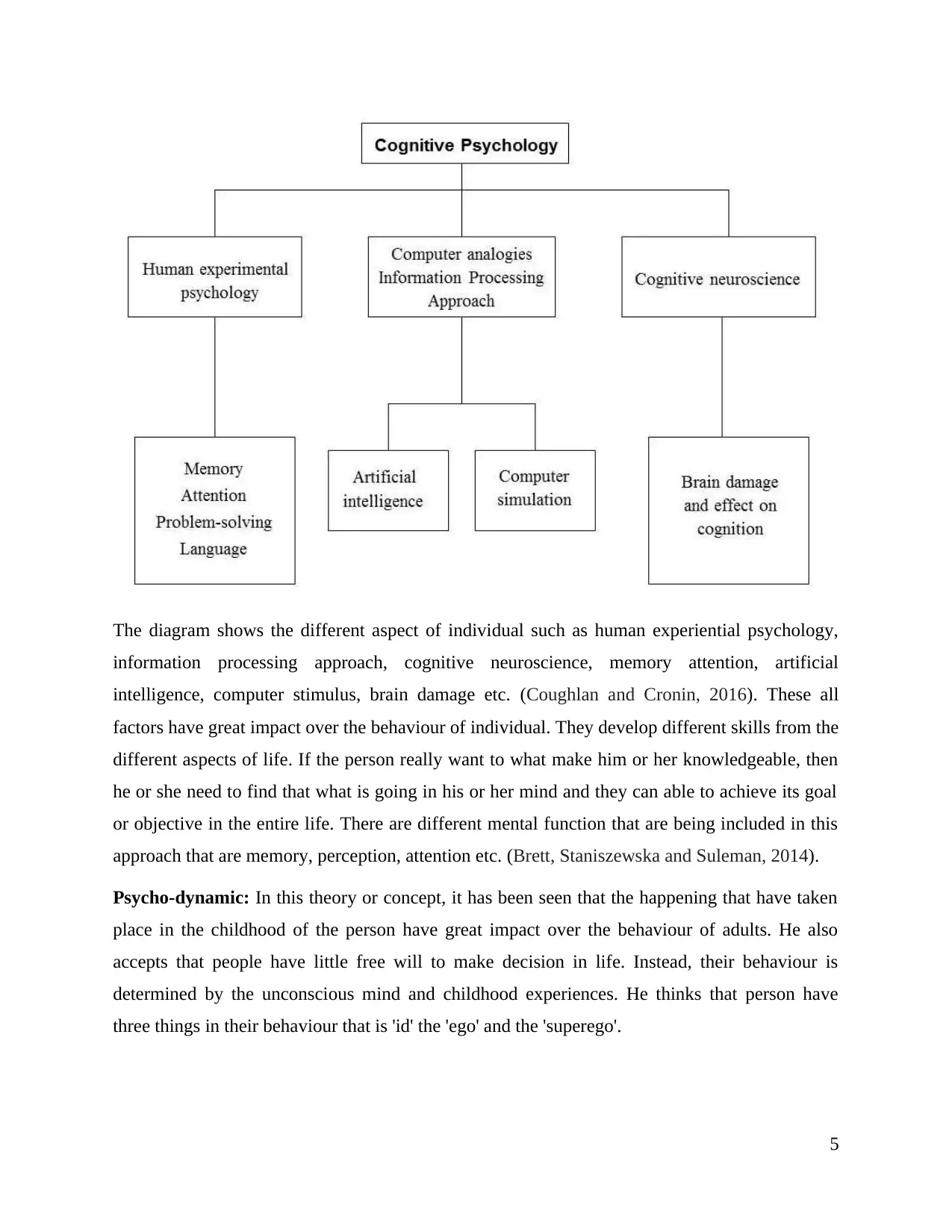
The diagram shows the different aspect of individual such as human experiential psychology,
information processing approach, cognitive neuroscience, memory attention, artificial
intelligence, computer stimulus, brain damage etc. (Coughlan and Cronin, 2016). These all
factors have great impact over the behaviour of individual. They develop different skills from the
different aspects of life. If the person really want to what make him or her knowledgeable, then
he or she need to find that what is going in his or her mind and they can able to achieve its goal
or objective in the entire life. There are different mental function that are being included in this
approach that are memory, perception, attention etc. (Brett, Staniszewska and Suleman, 2014).
Psycho-dynamic: In this theory or concept, it has been seen that the happening that have taken
place in the childhood of the person have great impact over the behaviour of adults. He also
accepts that people have little free will to make decision in life. Instead, their behaviour is
determined by the unconscious mind and childhood experiences. He thinks that person have
three things in their behaviour that is 'id' the 'ego' and the 'superego'.
5
information processing approach, cognitive neuroscience, memory attention, artificial
intelligence, computer stimulus, brain damage etc. (Coughlan and Cronin, 2016). These all
factors have great impact over the behaviour of individual. They develop different skills from the
different aspects of life. If the person really want to what make him or her knowledgeable, then
he or she need to find that what is going in his or her mind and they can able to achieve its goal
or objective in the entire life. There are different mental function that are being included in this
approach that are memory, perception, attention etc. (Brett, Staniszewska and Suleman, 2014).
Psycho-dynamic: In this theory or concept, it has been seen that the happening that have taken
place in the childhood of the person have great impact over the behaviour of adults. He also
accepts that people have little free will to make decision in life. Instead, their behaviour is
determined by the unconscious mind and childhood experiences. He thinks that person have
three things in their behaviour that is 'id' the 'ego' and the 'superego'.
5
Paraphrase This Document
Need a fresh take? Get an instant paraphrase of this document with our AI Paraphraser
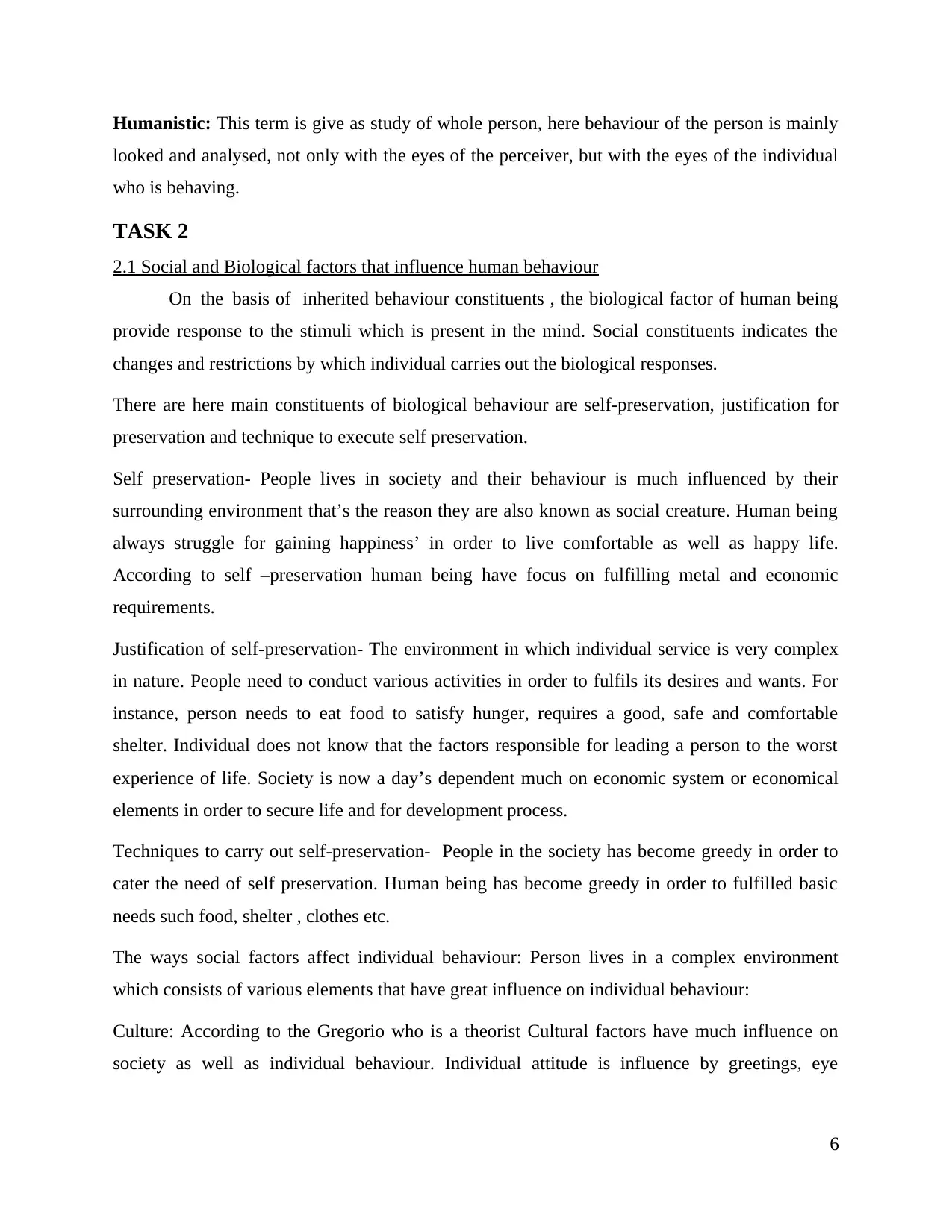
Humanistic: This term is give as study of whole person, here behaviour of the person is mainly
looked and analysed, not only with the eyes of the perceiver, but with the eyes of the individual
who is behaving.
TASK 2
2.1 Social and Biological factors that influence human behaviour
On the basis of inherited behaviour constituents , the biological factor of human being
provide response to the stimuli which is present in the mind. Social constituents indicates the
changes and restrictions by which individual carries out the biological responses.
There are here main constituents of biological behaviour are self-preservation, justification for
preservation and technique to execute self preservation.
Self preservation- People lives in society and their behaviour is much influenced by their
surrounding environment that’s the reason they are also known as social creature. Human being
always struggle for gaining happiness’ in order to live comfortable as well as happy life.
According to self –preservation human being have focus on fulfilling metal and economic
requirements.
Justification of self-preservation- The environment in which individual service is very complex
in nature. People need to conduct various activities in order to fulfils its desires and wants. For
instance, person needs to eat food to satisfy hunger, requires a good, safe and comfortable
shelter. Individual does not know that the factors responsible for leading a person to the worst
experience of life. Society is now a day’s dependent much on economic system or economical
elements in order to secure life and for development process.
Techniques to carry out self-preservation- People in the society has become greedy in order to
cater the need of self preservation. Human being has become greedy in order to fulfilled basic
needs such food, shelter , clothes etc.
The ways social factors affect individual behaviour: Person lives in a complex environment
which consists of various elements that have great influence on individual behaviour:
Culture: According to the Gregorio who is a theorist Cultural factors have much influence on
society as well as individual behaviour. Individual attitude is influence by greetings, eye
6
looked and analysed, not only with the eyes of the perceiver, but with the eyes of the individual
who is behaving.
TASK 2
2.1 Social and Biological factors that influence human behaviour
On the basis of inherited behaviour constituents , the biological factor of human being
provide response to the stimuli which is present in the mind. Social constituents indicates the
changes and restrictions by which individual carries out the biological responses.
There are here main constituents of biological behaviour are self-preservation, justification for
preservation and technique to execute self preservation.
Self preservation- People lives in society and their behaviour is much influenced by their
surrounding environment that’s the reason they are also known as social creature. Human being
always struggle for gaining happiness’ in order to live comfortable as well as happy life.
According to self –preservation human being have focus on fulfilling metal and economic
requirements.
Justification of self-preservation- The environment in which individual service is very complex
in nature. People need to conduct various activities in order to fulfils its desires and wants. For
instance, person needs to eat food to satisfy hunger, requires a good, safe and comfortable
shelter. Individual does not know that the factors responsible for leading a person to the worst
experience of life. Society is now a day’s dependent much on economic system or economical
elements in order to secure life and for development process.
Techniques to carry out self-preservation- People in the society has become greedy in order to
cater the need of self preservation. Human being has become greedy in order to fulfilled basic
needs such food, shelter , clothes etc.
The ways social factors affect individual behaviour: Person lives in a complex environment
which consists of various elements that have great influence on individual behaviour:
Culture: According to the Gregorio who is a theorist Cultural factors have much influence on
society as well as individual behaviour. Individual attitude is influence by greetings, eye
6
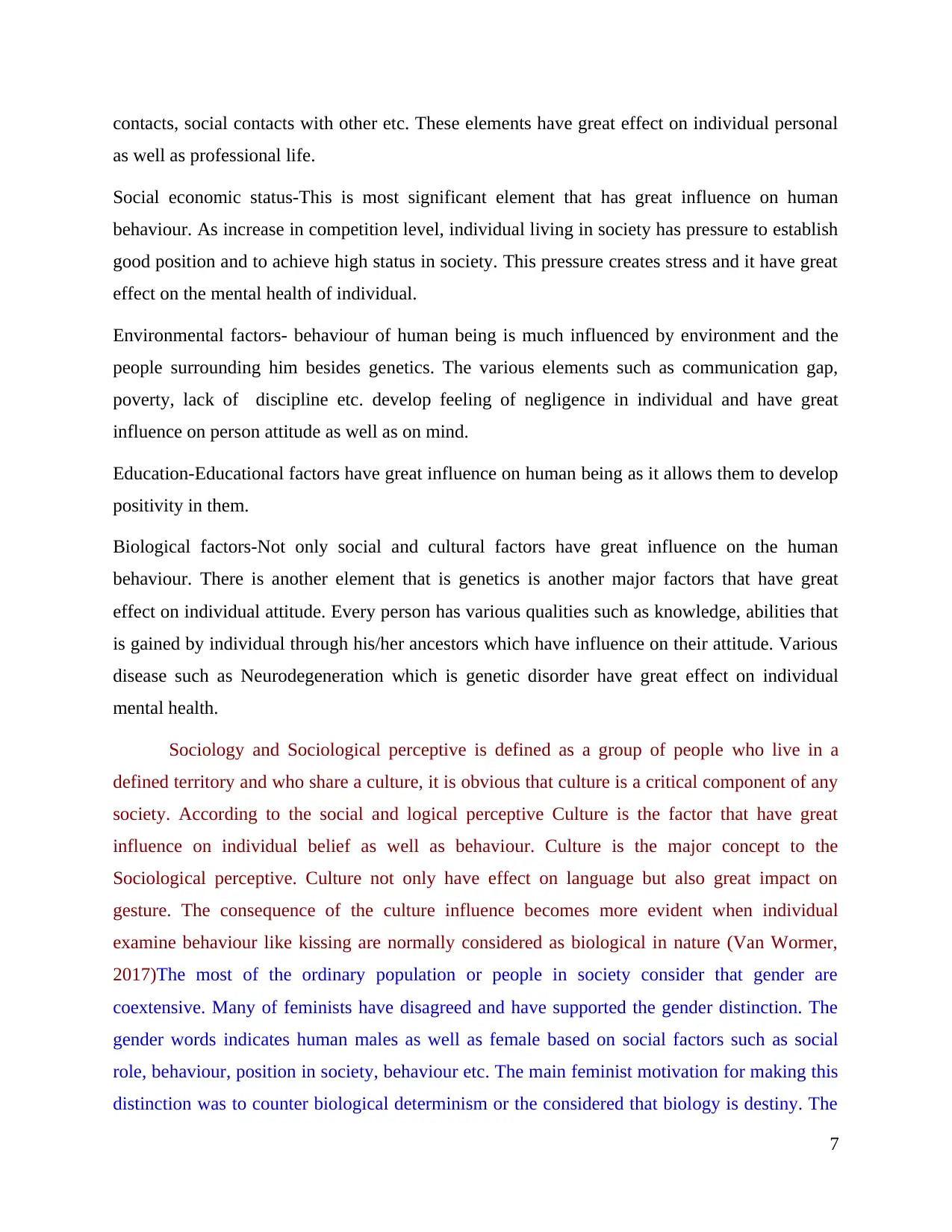
contacts, social contacts with other etc. These elements have great effect on individual personal
as well as professional life.
Social economic status-This is most significant element that has great influence on human
behaviour. As increase in competition level, individual living in society has pressure to establish
good position and to achieve high status in society. This pressure creates stress and it have great
effect on the mental health of individual.
Environmental factors- behaviour of human being is much influenced by environment and the
people surrounding him besides genetics. The various elements such as communication gap,
poverty, lack of discipline etc. develop feeling of negligence in individual and have great
influence on person attitude as well as on mind.
Education-Educational factors have great influence on human being as it allows them to develop
positivity in them.
Biological factors-Not only social and cultural factors have great influence on the human
behaviour. There is another element that is genetics is another major factors that have great
effect on individual attitude. Every person has various qualities such as knowledge, abilities that
is gained by individual through his/her ancestors which have influence on their attitude. Various
disease such as Neurodegeneration which is genetic disorder have great effect on individual
mental health.
Sociology and Sociological perceptive is defined as a group of people who live in a
defined territory and who share a culture, it is obvious that culture is a critical component of any
society. According to the social and logical perceptive Culture is the factor that have great
influence on individual belief as well as behaviour. Culture is the major concept to the
Sociological perceptive. Culture not only have effect on language but also great impact on
gesture. The consequence of the culture influence becomes more evident when individual
examine behaviour like kissing are normally considered as biological in nature (Van Wormer,
2017)The most of the ordinary population or people in society consider that gender are
coextensive. Many of feminists have disagreed and have supported the gender distinction. The
gender words indicates human males as well as female based on social factors such as social
role, behaviour, position in society, behaviour etc. The main feminist motivation for making this
distinction was to counter biological determinism or the considered that biology is destiny. The
7
as well as professional life.
Social economic status-This is most significant element that has great influence on human
behaviour. As increase in competition level, individual living in society has pressure to establish
good position and to achieve high status in society. This pressure creates stress and it have great
effect on the mental health of individual.
Environmental factors- behaviour of human being is much influenced by environment and the
people surrounding him besides genetics. The various elements such as communication gap,
poverty, lack of discipline etc. develop feeling of negligence in individual and have great
influence on person attitude as well as on mind.
Education-Educational factors have great influence on human being as it allows them to develop
positivity in them.
Biological factors-Not only social and cultural factors have great influence on the human
behaviour. There is another element that is genetics is another major factors that have great
effect on individual attitude. Every person has various qualities such as knowledge, abilities that
is gained by individual through his/her ancestors which have influence on their attitude. Various
disease such as Neurodegeneration which is genetic disorder have great effect on individual
mental health.
Sociology and Sociological perceptive is defined as a group of people who live in a
defined territory and who share a culture, it is obvious that culture is a critical component of any
society. According to the social and logical perceptive Culture is the factor that have great
influence on individual belief as well as behaviour. Culture is the major concept to the
Sociological perceptive. Culture not only have effect on language but also great impact on
gesture. The consequence of the culture influence becomes more evident when individual
examine behaviour like kissing are normally considered as biological in nature (Van Wormer,
2017)The most of the ordinary population or people in society consider that gender are
coextensive. Many of feminists have disagreed and have supported the gender distinction. The
gender words indicates human males as well as female based on social factors such as social
role, behaviour, position in society, behaviour etc. The main feminist motivation for making this
distinction was to counter biological determinism or the considered that biology is destiny. The
7
⊘ This is a preview!⊘
Do you want full access?
Subscribe today to unlock all pages.

Trusted by 1+ million students worldwide
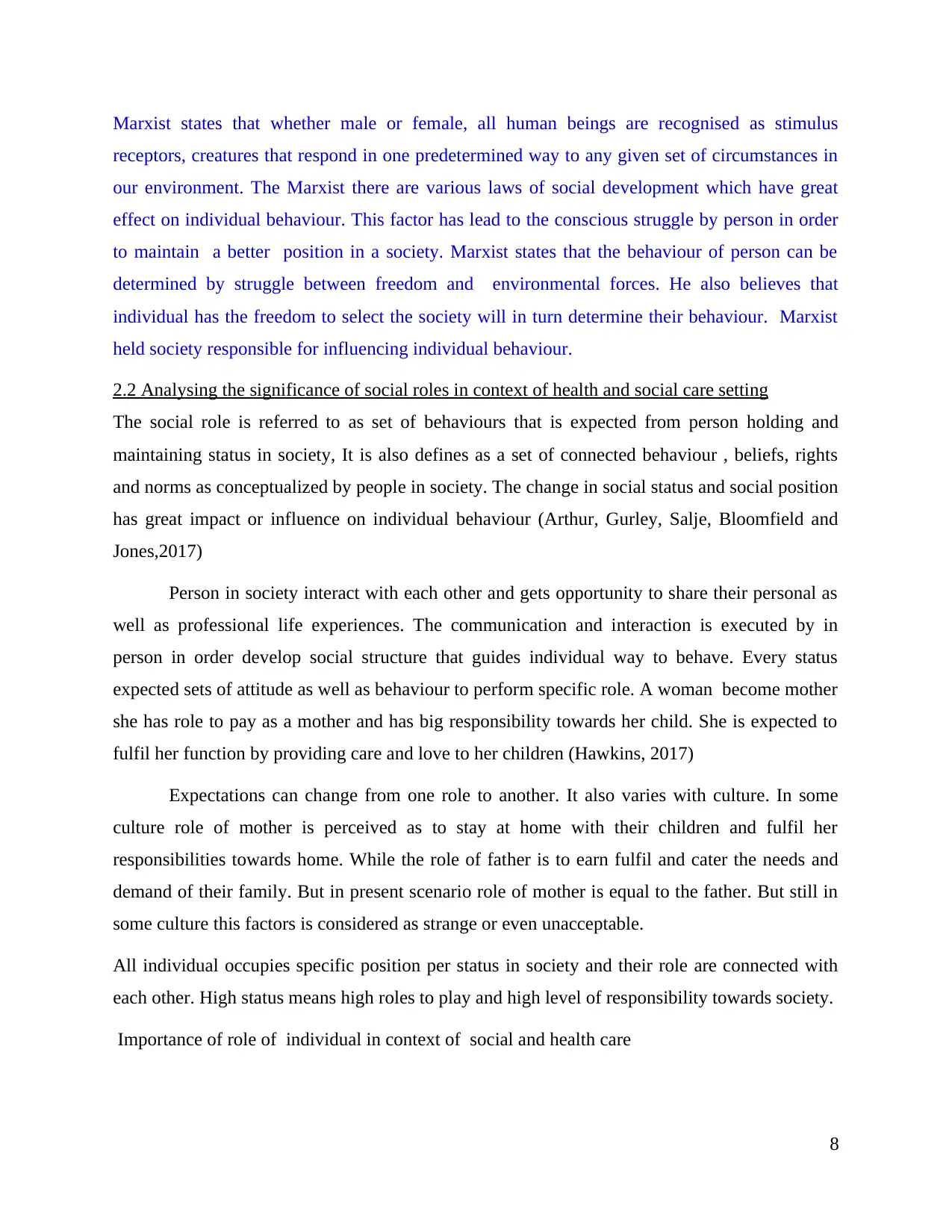
Marxist states that whether male or female, all human beings are recognised as stimulus
receptors, creatures that respond in one predetermined way to any given set of circumstances in
our environment. The Marxist there are various laws of social development which have great
effect on individual behaviour. This factor has lead to the conscious struggle by person in order
to maintain a better position in a society. Marxist states that the behaviour of person can be
determined by struggle between freedom and environmental forces. He also believes that
individual has the freedom to select the society will in turn determine their behaviour. Marxist
held society responsible for influencing individual behaviour.
2.2 Analysing the significance of social roles in context of health and social care setting
The social role is referred to as set of behaviours that is expected from person holding and
maintaining status in society, It is also defines as a set of connected behaviour , beliefs, rights
and norms as conceptualized by people in society. The change in social status and social position
has great impact or influence on individual behaviour (Arthur, Gurley, Salje, Bloomfield and
Jones,2017)
Person in society interact with each other and gets opportunity to share their personal as
well as professional life experiences. The communication and interaction is executed by in
person in order develop social structure that guides individual way to behave. Every status
expected sets of attitude as well as behaviour to perform specific role. A woman become mother
she has role to pay as a mother and has big responsibility towards her child. She is expected to
fulfil her function by providing care and love to her children (Hawkins, 2017)
Expectations can change from one role to another. It also varies with culture. In some
culture role of mother is perceived as to stay at home with their children and fulfil her
responsibilities towards home. While the role of father is to earn fulfil and cater the needs and
demand of their family. But in present scenario role of mother is equal to the father. But still in
some culture this factors is considered as strange or even unacceptable.
All individual occupies specific position per status in society and their role are connected with
each other. High status means high roles to play and high level of responsibility towards society.
Importance of role of individual in context of social and health care
8
receptors, creatures that respond in one predetermined way to any given set of circumstances in
our environment. The Marxist there are various laws of social development which have great
effect on individual behaviour. This factor has lead to the conscious struggle by person in order
to maintain a better position in a society. Marxist states that the behaviour of person can be
determined by struggle between freedom and environmental forces. He also believes that
individual has the freedom to select the society will in turn determine their behaviour. Marxist
held society responsible for influencing individual behaviour.
2.2 Analysing the significance of social roles in context of health and social care setting
The social role is referred to as set of behaviours that is expected from person holding and
maintaining status in society, It is also defines as a set of connected behaviour , beliefs, rights
and norms as conceptualized by people in society. The change in social status and social position
has great impact or influence on individual behaviour (Arthur, Gurley, Salje, Bloomfield and
Jones,2017)
Person in society interact with each other and gets opportunity to share their personal as
well as professional life experiences. The communication and interaction is executed by in
person in order develop social structure that guides individual way to behave. Every status
expected sets of attitude as well as behaviour to perform specific role. A woman become mother
she has role to pay as a mother and has big responsibility towards her child. She is expected to
fulfil her function by providing care and love to her children (Hawkins, 2017)
Expectations can change from one role to another. It also varies with culture. In some
culture role of mother is perceived as to stay at home with their children and fulfil her
responsibilities towards home. While the role of father is to earn fulfil and cater the needs and
demand of their family. But in present scenario role of mother is equal to the father. But still in
some culture this factors is considered as strange or even unacceptable.
All individual occupies specific position per status in society and their role are connected with
each other. High status means high roles to play and high level of responsibility towards society.
Importance of role of individual in context of social and health care
8
Paraphrase This Document
Need a fresh take? Get an instant paraphrase of this document with our AI Paraphraser
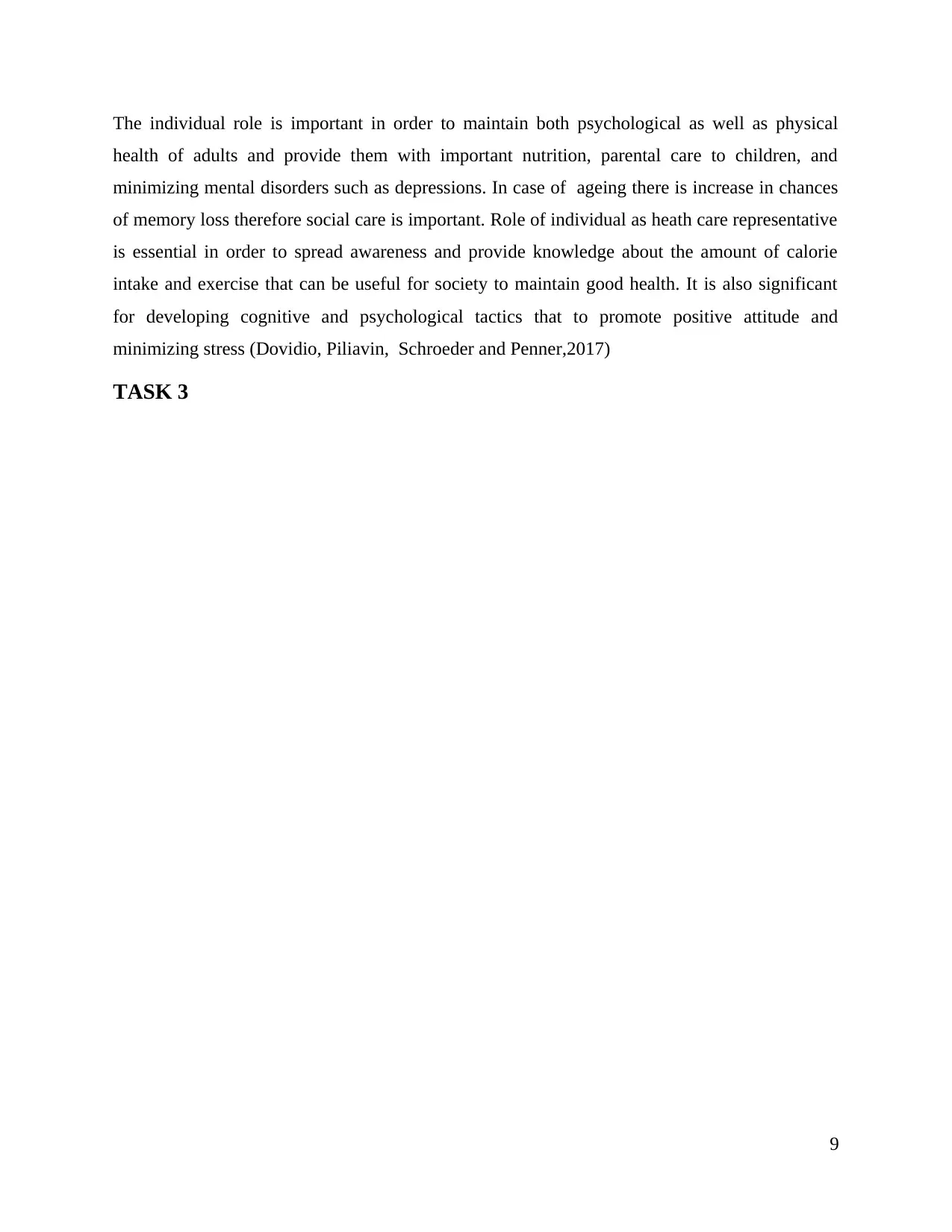
The individual role is important in order to maintain both psychological as well as physical
health of adults and provide them with important nutrition, parental care to children, and
minimizing mental disorders such as depressions. In case of ageing there is increase in chances
of memory loss therefore social care is important. Role of individual as heath care representative
is essential in order to spread awareness and provide knowledge about the amount of calorie
intake and exercise that can be useful for society to maintain good health. It is also significant
for developing cognitive and psychological tactics that to promote positive attitude and
minimizing stress (Dovidio, Piliavin, Schroeder and Penner,2017)
TASK 3
9
health of adults and provide them with important nutrition, parental care to children, and
minimizing mental disorders such as depressions. In case of ageing there is increase in chances
of memory loss therefore social care is important. Role of individual as heath care representative
is essential in order to spread awareness and provide knowledge about the amount of calorie
intake and exercise that can be useful for society to maintain good health. It is also significant
for developing cognitive and psychological tactics that to promote positive attitude and
minimizing stress (Dovidio, Piliavin, Schroeder and Penner,2017)
TASK 3
9
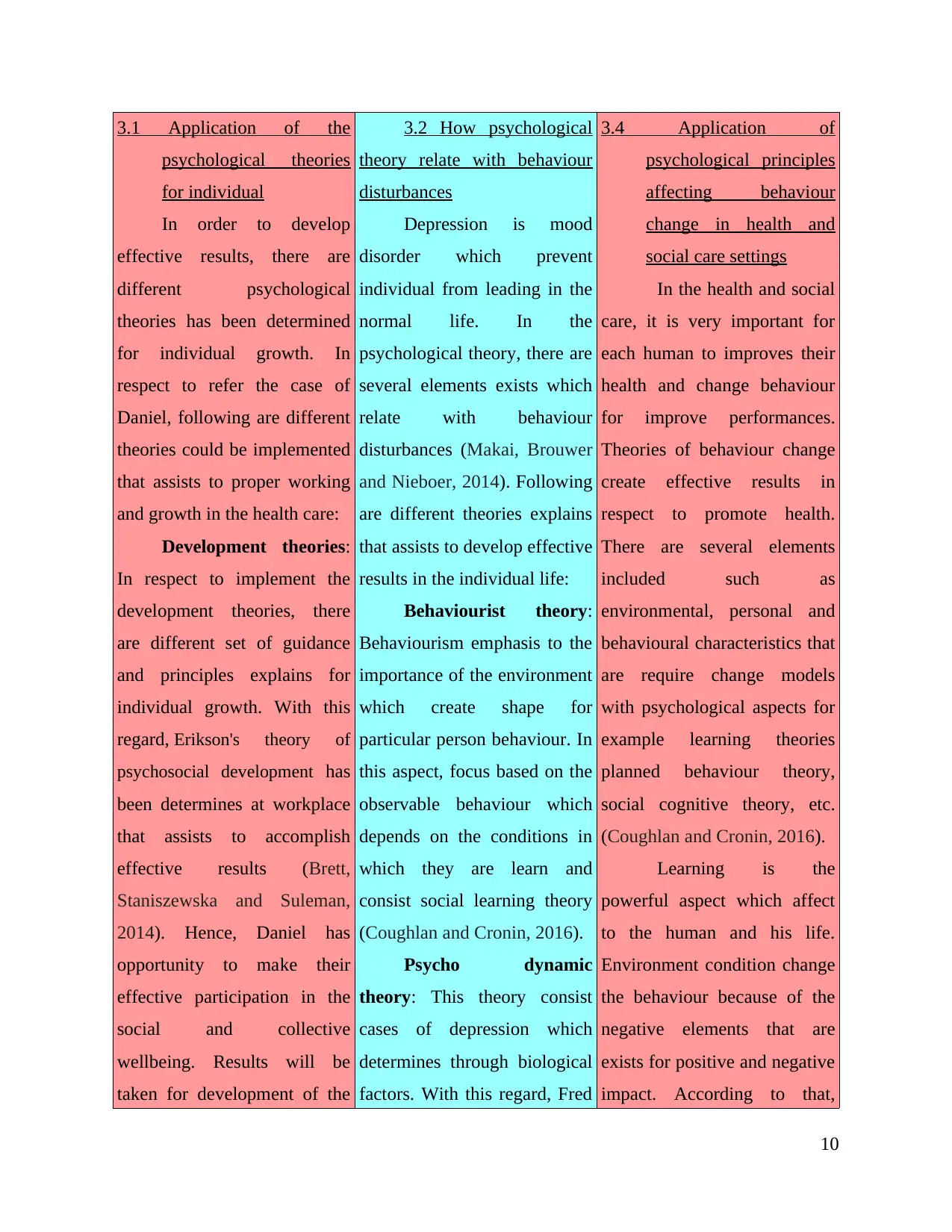
3.1 Application of the
psychological theories
for individual
In order to develop
effective results, there are
different psychological
theories has been determined
for individual growth. In
respect to refer the case of
Daniel, following are different
theories could be implemented
that assists to proper working
and growth in the health care:
Development theories:
In respect to implement the
development theories, there
are different set of guidance
and principles explains for
individual growth. With this
regard, Erikson's theory of
psychosocial development has
been determines at workplace
that assists to accomplish
effective results (Brett,
Staniszewska and Suleman,
2014). Hence, Daniel has
opportunity to make their
effective participation in the
social and collective
wellbeing. Results will be
taken for development of the
3.2 How psychological
theory relate with behaviour
disturbances
Depression is mood
disorder which prevent
individual from leading in the
normal life. In the
psychological theory, there are
several elements exists which
relate with behaviour
disturbances (Makai, Brouwer
and Nieboer, 2014). Following
are different theories explains
that assists to develop effective
results in the individual life:
Behaviourist theory:
Behaviourism emphasis to the
importance of the environment
which create shape for
particular person behaviour. In
this aspect, focus based on the
observable behaviour which
depends on the conditions in
which they are learn and
consist social learning theory
(Coughlan and Cronin, 2016).
Psycho dynamic
theory: This theory consist
cases of depression which
determines through biological
factors. With this regard, Fred
3.4 Application of
psychological principles
affecting behaviour
change in health and
social care settings
In the health and social
care, it is very important for
each human to improves their
health and change behaviour
for improve performances.
Theories of behaviour change
create effective results in
respect to promote health.
There are several elements
included such as
environmental, personal and
behavioural characteristics that
are require change models
with psychological aspects for
example learning theories
planned behaviour theory,
social cognitive theory, etc.
(Coughlan and Cronin, 2016).
Learning is the
powerful aspect which affect
to the human and his life.
Environment condition change
the behaviour because of the
negative elements that are
exists for positive and negative
impact. According to that,
10
psychological theories
for individual
In order to develop
effective results, there are
different psychological
theories has been determined
for individual growth. In
respect to refer the case of
Daniel, following are different
theories could be implemented
that assists to proper working
and growth in the health care:
Development theories:
In respect to implement the
development theories, there
are different set of guidance
and principles explains for
individual growth. With this
regard, Erikson's theory of
psychosocial development has
been determines at workplace
that assists to accomplish
effective results (Brett,
Staniszewska and Suleman,
2014). Hence, Daniel has
opportunity to make their
effective participation in the
social and collective
wellbeing. Results will be
taken for development of the
3.2 How psychological
theory relate with behaviour
disturbances
Depression is mood
disorder which prevent
individual from leading in the
normal life. In the
psychological theory, there are
several elements exists which
relate with behaviour
disturbances (Makai, Brouwer
and Nieboer, 2014). Following
are different theories explains
that assists to develop effective
results in the individual life:
Behaviourist theory:
Behaviourism emphasis to the
importance of the environment
which create shape for
particular person behaviour. In
this aspect, focus based on the
observable behaviour which
depends on the conditions in
which they are learn and
consist social learning theory
(Coughlan and Cronin, 2016).
Psycho dynamic
theory: This theory consist
cases of depression which
determines through biological
factors. With this regard, Fred
3.4 Application of
psychological principles
affecting behaviour
change in health and
social care settings
In the health and social
care, it is very important for
each human to improves their
health and change behaviour
for improve performances.
Theories of behaviour change
create effective results in
respect to promote health.
There are several elements
included such as
environmental, personal and
behavioural characteristics that
are require change models
with psychological aspects for
example learning theories
planned behaviour theory,
social cognitive theory, etc.
(Coughlan and Cronin, 2016).
Learning is the
powerful aspect which affect
to the human and his life.
Environment condition change
the behaviour because of the
negative elements that are
exists for positive and negative
impact. According to that,
10
⊘ This is a preview!⊘
Do you want full access?
Subscribe today to unlock all pages.

Trusted by 1+ million students worldwide
1 out of 15
Related Documents
Your All-in-One AI-Powered Toolkit for Academic Success.
+13062052269
info@desklib.com
Available 24*7 on WhatsApp / Email
![[object Object]](/_next/static/media/star-bottom.7253800d.svg)
Unlock your academic potential
Copyright © 2020–2026 A2Z Services. All Rights Reserved. Developed and managed by ZUCOL.





